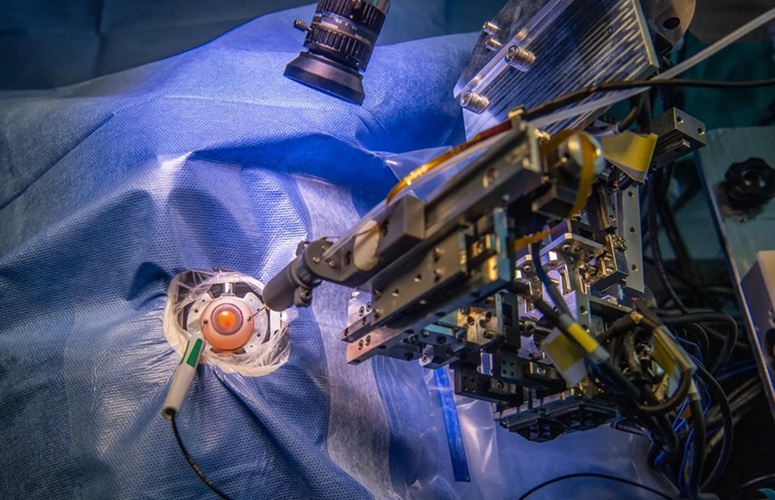Fujifilm Showcases New DR Detectors and AI Initiative in Chicago
|
By Theresa Herman, Regional Director Posted on 26 Nov 2018 |

Image: Fujifilm unveiled two new DR detectors at the RSNA annual meeting in Chicago (Photo courtesy of Fujifilm Medical Systems).
Fujifilm Medical Systems U.S.A, Inc, (Stamford, CT, USA), a provider of diagnostic imaging and medical informatics solutions, unveiled two new digital radiography (DR) detectors – the CALNEO Dual (available only in Japan) and the FDR ES – at the 2018 Radiological Society of North America (RSNA) annual meeting, November 25-30 in Chicago, Ill., USA. The company also presented, REiLI, its global Medical Imaging and Informatics Artificial Intelligence (AI) technology initiative, as well as hosted an educational symposium focusing on the impact of AI on enterprise imaging now and into the future.
The CALNEO Dual is a 17-inch x 17-inch standard cassette sized detector featuring two sensitivity capture layers, coupled with Fujifilm intelligent energy subtraction processing. A single exposure produces three images; traditional, soft tissue only and bone only views. These distinctly different images can be utilized for visualizing or tracking of lung cancer nodules. The innovative dual capture layer design yields higher definition general X-ray images, enhancing separation accuracy of bone detail and soft tissue.
Fujifilm’s new FDR ES detector is a next-generation X-ray room retrofit solution designed with the essential conveniences of Fujifilm DR image acquisition innovations. The light, portable detectors are packed with all the benefits of Fujifilm's high sensitivity detector technologies and the latest refinements in image processing. Optimized for existing X-ray room equipment, these detectors feature simplified integration for a more affordable DR retrofit without sacrificing dose, workflow and image quality performance. In addition to these latest and most advanced detectors, Fujifilm also showcased its comprehensive line of DR detectors and mobile DR solutions to suit the needs of large as well as small imaging facilities. At RSNA 2018, the company offered a glimpse into the future of DR detector technologies with an under the cover, inside view prototype display.
"Once again, Fujifilm is pushing the limits, expanding the capabilities of digital radiography," said Johann Fernando, Ph.D., CEO of FUJIFILM Medical Systems U.S.A, Inc. "Our latest advances with the CALNEO Dual represent a transformation in image capture technologies that will allow clinicians to visualize more detail than before and from a single exposure."
At RSNA 2018, Fujifilm also featured dedicated workstations demonstrating AI platform use cases within Synapse 5 PACS driven by REiLI. Under the REiLI brand, Fujifilm is developing AI technologies that strongly support diagnostic imaging workflow, leveraging the combination of deep learning in its AI technology with the company’s image processing heritage.
Applications currently in development include Region Recognition, an AI technology to accurately recognize and consistently extract organ regions, regardless of deviations in shape, presence or absence of disease, and imaging conditions; Computer Aided Detection, an AI technology to reduce the time of image interpretation and support radiologists’ clinical decision making; Workflow Support, using AI technology to realize optimal study prioritization, alert communications of AI findings, and report population automation.
“Our goal is to provide an open platform which manages the workflow and delivery of AI technologies through Synapse clinical applications enabled for AI results and use cases, and realize a new and more powerful diagnostic workflow that advances the field of radiology,” said Bill Lacy, Vice President of Medical Informatics at FUJIFILM Medical Systems, U.S.A, Inc.
The CALNEO Dual is a 17-inch x 17-inch standard cassette sized detector featuring two sensitivity capture layers, coupled with Fujifilm intelligent energy subtraction processing. A single exposure produces three images; traditional, soft tissue only and bone only views. These distinctly different images can be utilized for visualizing or tracking of lung cancer nodules. The innovative dual capture layer design yields higher definition general X-ray images, enhancing separation accuracy of bone detail and soft tissue.
Fujifilm’s new FDR ES detector is a next-generation X-ray room retrofit solution designed with the essential conveniences of Fujifilm DR image acquisition innovations. The light, portable detectors are packed with all the benefits of Fujifilm's high sensitivity detector technologies and the latest refinements in image processing. Optimized for existing X-ray room equipment, these detectors feature simplified integration for a more affordable DR retrofit without sacrificing dose, workflow and image quality performance. In addition to these latest and most advanced detectors, Fujifilm also showcased its comprehensive line of DR detectors and mobile DR solutions to suit the needs of large as well as small imaging facilities. At RSNA 2018, the company offered a glimpse into the future of DR detector technologies with an under the cover, inside view prototype display.
"Once again, Fujifilm is pushing the limits, expanding the capabilities of digital radiography," said Johann Fernando, Ph.D., CEO of FUJIFILM Medical Systems U.S.A, Inc. "Our latest advances with the CALNEO Dual represent a transformation in image capture technologies that will allow clinicians to visualize more detail than before and from a single exposure."
At RSNA 2018, Fujifilm also featured dedicated workstations demonstrating AI platform use cases within Synapse 5 PACS driven by REiLI. Under the REiLI brand, Fujifilm is developing AI technologies that strongly support diagnostic imaging workflow, leveraging the combination of deep learning in its AI technology with the company’s image processing heritage.
Applications currently in development include Region Recognition, an AI technology to accurately recognize and consistently extract organ regions, regardless of deviations in shape, presence or absence of disease, and imaging conditions; Computer Aided Detection, an AI technology to reduce the time of image interpretation and support radiologists’ clinical decision making; Workflow Support, using AI technology to realize optimal study prioritization, alert communications of AI findings, and report population automation.
“Our goal is to provide an open platform which manages the workflow and delivery of AI technologies through Synapse clinical applications enabled for AI results and use cases, and realize a new and more powerful diagnostic workflow that advances the field of radiology,” said Bill Lacy, Vice President of Medical Informatics at FUJIFILM Medical Systems, U.S.A, Inc.
Latest AI News
Channels
Critical Care
view channel
Light-Based Technology to Measure Brain Blood Flow Could Diagnose Stroke and TBI
Monitoring blood flow in the brain is crucial for diagnosing and treating neurological conditions such as stroke, traumatic brain injury (TBI), and vascular dementia. However, current imaging methods like... Read more
AI Heart Attack Risk Assessment Tool Outperforms Existing Methods
For decades, doctors have relied on standardized scoring systems to assess patients with the most common type of heart attack—non-ST-elevation acute coronary syndrome (NSTE-ACS). The GRACE score, used... Read moreSurgical Techniques
view channel
Robotic Assistant Delivers Ultra-Precision Injections with Rapid Setup Times
Age-related macular degeneration (AMD) is a leading cause of blindness worldwide, affecting nearly 200 million people, a figure expected to rise to 280 million by 2040. Current treatment involves doctors... Read more
Minimally Invasive Endoscopic Surgery Improves Severe Stroke Outcomes
Intracerebral hemorrhage, a type of stroke caused by bleeding deep within the brain, remains one of the most challenging neurological emergencies to treat. Accounting for about 15% of all strokes, it carries... Read morePatient Care
view channel
Revolutionary Automatic IV-Line Flushing Device to Enhance Infusion Care
More than 80% of in-hospital patients receive intravenous (IV) therapy. Every dose of IV medicine delivered in a small volume (<250 mL) infusion bag should be followed by subsequent flushing to ensure... Read more
VR Training Tool Combats Contamination of Portable Medical Equipment
Healthcare-associated infections (HAIs) impact one in every 31 patients, cause nearly 100,000 deaths each year, and cost USD 28.4 billion in direct medical expenses. Notably, up to 75% of these infections... Read more
Portable Biosensor Platform to Reduce Hospital-Acquired Infections
Approximately 4 million patients in the European Union acquire healthcare-associated infections (HAIs) or nosocomial infections each year, with around 37,000 deaths directly resulting from these infections,... Read moreFirst-Of-Its-Kind Portable Germicidal Light Technology Disinfects High-Touch Clinical Surfaces in Seconds
Reducing healthcare-acquired infections (HAIs) remains a pressing issue within global healthcare systems. In the United States alone, 1.7 million patients contract HAIs annually, leading to approximately... Read moreHealth IT
view channel
Printable Molecule-Selective Nanoparticles Enable Mass Production of Wearable Biosensors
The future of medicine is likely to focus on the personalization of healthcare—understanding exactly what an individual requires and delivering the appropriate combination of nutrients, metabolites, and... Read moreBusiness
view channel
Philips and Masimo Partner to Advance Patient Monitoring Measurement Technologies
Royal Philips (Amsterdam, Netherlands) and Masimo (Irvine, California, USA) have renewed their multi-year strategic collaboration, combining Philips’ expertise in patient monitoring with Masimo’s noninvasive... Read more
B. Braun Acquires Digital Microsurgery Company True Digital Surgery
The high-end microsurgery market in neurosurgery, spine, and ENT is undergoing a significant transformation. Traditional analog microscopes are giving way to digital exoscopes, which provide improved visualization,... Read more
CMEF 2025 to Promote Holistic and High-Quality Development of Medical and Health Industry
The 92nd China International Medical Equipment Fair (CMEF 2025) Autumn Exhibition is scheduled to be held from September 26 to 29 at the China Import and Export Fair Complex (Canton Fair Complex) in Guangzhou.... Read more
















